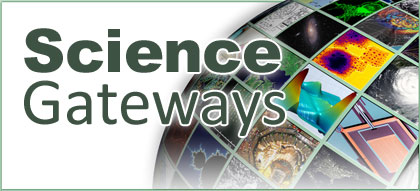News
SDSC, ECSU, IU, Purdue, TACC and Michigan Awarded NSF Planning Grant for Science Gateways Institute
Published August 21, 2012
|
|
The San Diego Supercomputer Center (SDSC) at the University of California, San Diego is the lead institution on a National Science Foundation (NSF) planning grant for a Science Gateway Institute that would offer a complete range of services aimed at connecting numerous individual groups developing domain-specific, user-friendly, Web-based portals and tools that enable scientific research.
Partner institutions include Elizabeth City State University; Indiana University; Purdue University; the Texas Advanced Computing Center (TACC) at The University of Texas, Austin; and the University of Michigan, Ann Arbor.
Through a one-year, $500,000 conceptualization award, the team has been asked to develop a strategic plan for a much larger Science Gateway Institute as part of the NSF’s Software Institutes program. The Institute will provide a full support system for those developing gateways – from technical expertise to licensing advice to long-term planning and project management.
Science gateways are used today to provide access to many of the tools used in cutting-edge research – telescopes, seismic shake tables, supercomputers, sky surveys, undersea sensors, and more. Such gateways connect often diverse resources in a scalable way that saves researchers and institutions both time and money. A single gateway can give thousands of users access to current, optimized versions of analysis codes at any time. Codes with a large user base can be used by thousands through a single installation rather than hundreds of local installations.
These gateways are often designed directly by the science communities, but in isolation from each other. Currently, there is no NSF-wide forum for developers to share software approaches and development experiences that may be similar regardless of domain.
“Sharing expertise about basic infrastructure allows developers to concentrate on the novel, the challenging, and the cutting-edge development needed by their specific user community,” said Nancy Wilkins-Diehr, SDSC associate director and principal investigator on the project.
The team envisions the Science Gateways Institute as offering a startup, or incubation service, which would include complete development environment and hosting service, as well as consulting, documentation, and software recommendations to ensure the gateway is properly planned for maximum participation and success. An extended support team could build gateways for research teams that request support, transferring knowledge by teaching those teams what it takes to build, enhance, and operate gateways in the process.
“In previous research and community engagement projects, developers of gateways and portals have indicated a strong desire for this type of mutual support and community building,” said Katherine Lawrence, from the University of Michigan’s School of Information.
The Institute would also serve as a forum for scientific web developers across the NSF and other agencies and institutions, including international organizations. Finally, the institute would provide tremendous workforce development opportunities for students through NSF Presidential Award winner Dr. Linda Hayden’s (ECSU) leadership in STEM mentoring.
“The gateway framework we envision is a modular, layered approach that supports community contributions and allows developers to pick and choose the components they need, from job submission and security modules to an entire end-to-end solution,” said Dan Stanzione, deputy director at TACC and co-investigator on the project. “Gateways are growing in importance to us as we expand beyond our traditional user base; this project will help us reach many new communities of users.”
“One of the most compelling features of gateways is that they provide access not only to leading researchers but in many cases to all interested researchers, students, teachers, and citizen scientists,” said SDSC’s Wilkins-Diehr. “Anyone, regardless of institutional affiliation, can analyze important datasets, access advanced instruments, and use highly capable supercomputers. This democratization of science can be tremendously powerful, allowing many more minds to make discoveries and consider the great research questions.”
About SDSC
As an Organized Research Unit of UC San Diego, SDSC is considered a leader in data-intensive computing and all aspects of ‘big data’, which includes data integration, performance modeling, data mining, software development, workflow automation, and more. SDSC supports hundreds of multidisciplinary programs spanning a wide variety of domains, from earth sciences and biology to astrophysics, bioinformatics, and health IT. With its two newest supercomputer systems, Trestles and Gordon, SDSC is a partner in XSEDE (Extreme Science and Engineering Discovery Environment), the most advanced collection of integrated digital resources and services in the world.
Media Contacts:
Jan Zverina, SDSC Communications
858 534-5111 or jzverina@sdsc.edu
Warren R. Froelich, SDSC Communications
858 822-3622 or froelich@sdsc.edu
Faith Singer-Villalobos, TACC Communications
512 232-5771 or faith@tacc.utexas.edu
Glenda Bullock, UMSI Communications
734 647-7313 or gbullock@umich.edu
Categories
Archive
Related Links
UC San Diego: http://www.ucsd.edu/
Texas Advanced Computing Center: http://www.tacc.utexas.edu/
Indiana University: http://www.indiana.edu/
Purdue University: http://www.rcac.purdue.edu/
University of Michigan School of Information: www.si.umich.edu
Elizabeth City State University: http://www.ecsu.edu/
National Science Foundation: http://www.nsf.gov/


